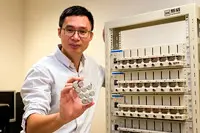 Scientists from Nanyang Technological University in Singapore say they have developed a battery that can be recharged to 70% of its capacity in two minutes. The team – led by associate professor Chen Xiaodong, pictured – also believes such a battery will have a lifespan of more than 20 years and be capable of more than 10,000 recharging cycles.
Scientists from Nanyang Technological University in Singapore say they have developed a battery that can be recharged to 70% of its capacity in two minutes. The team – led by associate professor Chen Xiaodong, pictured – also believes such a battery will have a lifespan of more than 20 years and be capable of more than 10,000 recharging cycles.
In its approach, the research team replaced the graphite normally used for the anode in Li-ion batteries with a gel made from titanium dioxide (TiO2). Although TiO2 particles are normally spherical, the scientists developed a way to turn them into nanotubes – and the team says this is what helps to speed the chemical reactions taking place.
NTU professor Rachid Yazami, co-inventor of the lithium graphite anode 34 years ago, said he thought the invention would be the next big leap in battery technology.
"There is still room for improvement and one such key area is the power density – how much power can be stored in a certain amount of space – which directly relates to the fast charge ability. Ideally, the charge time for batteries in electric vehicles should be less than 15 minutes, which Prof Chen's nanostructured anode has proven to do."
The technology is currently being licensed and Prof Chen expects the new generation of fast charging batteries will be launched in two years.
"With our nanotechnology, electric cars would be able to increase their range dramatically with just five minutes of charging, which is on par with the time needed to pump petrol for current cars," Prof Chen said. "Equally importantly, we can now drastically cut down the waste generated by disposed batteries."
Author
Graham Pitcher
Source: www.newelectronics.co.uk
